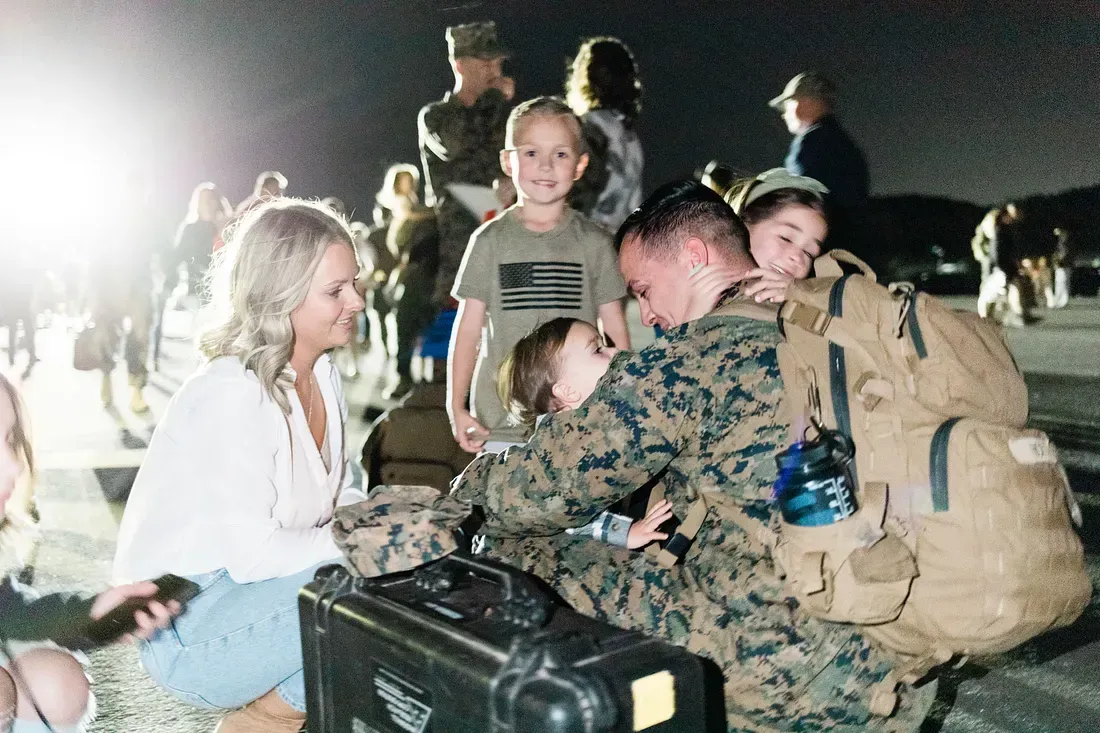How to Support a Military Spouse
Have you ever wondered why military spouses are some of the toughest, most resilient people you know? Furthermore, have you wondered why they may be that way? We’re here to pull back the curtain and share what the wave of deployment emotions look like for many of our fellow military spouses.
We want to help with the understanding of what this cycle may look like so we can bridge the gap between wanting to be supportive and not knowing the best way to do so.
Let’s start with an honest fact, as Military Spouses, we know the good intentions that come with asking us what our spouses are doing, but please avoid doing so. If we feel like sharing, we will, but most of the time we won’t.
As a military spouse, compartmentalization is how we get through each day. If we’re at work, we want to focus on work, not the fact that our spouse is gone, and if we’re spending time with friends, we likely want to distract ourselves from all that is going on with our spouses (especially because we likely don’t know where they are at the time). We will take time to process what we are experiencing, but we often prefer to do that alone or with people who get it (our military spouse sisters and brothers).

An Honest Look at the Emotional Cycle of Deployments
These are the phases that many military spouses go through when their spouses deploy. A deployment is a period of time when a service member is sent to another location to serve their country. It is common for this location to be a potentially dangerous place, and a place where we will have little contact with them throughout the extent of their deployment; we’re often lucky if they can connect to WiFi or make a phone call while deployed.
Stage 1: Anticipation
- This hits wen our servicemember is notified that they are deploying; they receive orders to deploy. This means that our service members have an appximate day and time that they will be deployed along with a relative location.
- This can cause tension at home with some feelings of resentment. As a means of protecting ourselves emotionally, we tend to start distancing ourselves from each other.
- These feelings can be especially taxing if our spouse is deploying with hours or a day’s notice; the first 3 stages are happening in a short period of time, causing emotional exhaustion.
- Please don’t ask when they’re leaving, this is confidential information that can impact OPSEC (Operational Security), remember the phrase “Loose Lips Sink Ships?” This is what it’s relating to, we can’t share dates or locations of troop movements.
Stage 2: Detachment/Withdrawal
- Leading up to the deployment, our service member is usually very busy preparing to leave and isn’t around much. Many people feel ready to, “just get it started” or “rip the band-aid off” as a means of starting the deployment so they can begin the countdown to homecoming.
- This is a hectic time and it also impacts children in their ways, we generally see them acting out because of the confusion and changes they are facing.
Stage 3: Dark Day
- The day the service member leaves is usually the day where it all hits the spouse; many spouses choose to take a day to feel sad and grieve the lost time with their spouse and allow all of their emotions to hit them.
- It feels like a release of emotions when they leave because the figurative band-aid has been ripped off and they have finally left. The lead-up to them leaving is a high-stress time and we often don’t take time to stop and process what we’re feeling.
Stage 4: Finding a New Normal
- The first month+ of deployment is when the spouse and family hit a wall that is known as emotional disorganization, which is a massive disruption to your family’s routine causing emotions to be everywhere.
- As the spouse managing the homefront, we naturally have more responsibilities to handle, and our children sometimes regress in their progress with any milestones for their age (such as sleep schedules).
- This first month or so sets new routines as our family finds our new norms. We ask that you give us grace as we work through this new routine.
Stage 5: New Routine Setting
- Once the first month (or so) has passed, and we have begun to find our new normal, it’s often the time when we feel we’ve hit our confident and independent stage. It takes some trial and error, but we often surprise ourselves with how well we’re managing things at home.
- It may take our kids a bit more time to adjust (and vice versa). Everyone deserves to give themselves and others grace through this period of time.
- While we may look like we have it all figured out, it is not uncommon for us to have setbacks during the new routine setting stage, there will be difficult days, especially if we hear an update on the news that may pertain to our spouse, or if we don’t hear from our spouse for a few weeks.
- Please refrain from asking where our spouse is or how they are. We know you mean well, but this can bring up a range of emotions. If we want to share how we’re feeling, we will reach out.
Stage 6: Prepping for Homecoming
- Usually about a month before the anticipated end of the deployment, we begin preparing for homecoming. There is usually a wide range of emotions that come through this phase; from excitement to anxiety and some fear about what it will be like when they’re home. We are usually feeling anticipation and potential hesitation for what reintegration will look like. Reintegration is when our spouse is home from deployment and we’re working through finding our family’s new norm.
- Our kiddos usually look to us (as spouses) for emotional cues. If we have young kids, it’s common for us to not discuss that we’re expecting our spouse home soon as a means of keeping the “norm” going as long as possible. Every family knows what’s best for them.
- There are times when homecoming is pushed out until an unknown date due to the needs of the deployment changing. When they’re home, we will let you know when we’re ready. Please don’t ask what the date is, we likely don’t know, and even if we do, it’s going to change multiple times. They’re not home until they’re in our arms again.
Stage 7: Homecoming
- This date will likely change several times, and once a date is finalized, the timing will likely also change many times.
- The first 24 hours/couple of days generally feels like a honeymoon where the excitement of them returning has emotions running high, and we’re physically relieved to just have them back in our home again.
- During the initial hours and days of homecoming, our kiddos may be apprehensive and unsure about their parent returning, it may take them longer to warm up to their parent being home. If you see/interact with our kids during this time, please know that they’ll find their new bond with their service member parent in time.
Stage 8: Reintegration
- This relates to finding a new normal at the beginning of deployment. Now that our servicemember is home, our family’s responsibilities need to be re-divided; this can cause some friction. Generally after a few weeks to a month, our family’s new normal is found. This is a normal part of the process of our service member returning.
- This can be stressful because we have all become accustomed to our spouse not being home. While we are happy they are home, this is a massive adjustment for both ourselves, our service members, and our family. It’s not uncommon for military spouses to take a period of time off or be a bit more split-minded during this reintegration period. It will end soon, and if we’re putting more focus on our family during this time, know that it’s for the best long-term.
We share these phases of deployment to identify the range of responsibilities, emotions, and experiences military spouses and service members face. This is usually occurring in conjunction with our jobs and any other life responsibilities we have. Please give us grace and know that if we need time off/time to process/are going to be slow to respond that day, we will let you know.

How Can You Support a Military Spouse?
We understand that there are curiosities about how we can provide support to military spouses and what you can do to support them. Holding space for us, sharing that you’re here for us, and giving us grace is one of the best ways to support us. Oftentimes we just need to be reminded that we don’t need to have it all together all the time.
If you’d like to do something a bit more tangible for a military spouse, here are a few ways you can provide support:
- Sending a meal gift card (Doordash, Ubereats, Starbucks, etc)
- Sending flowers with an encouraging message
- Sending gift cards (self-care often goes to the wayside when we’re in the thick of deployment)
- A handwritten letter/card letting the spouse know that you are thinking of them
- Sending a personalized gift (think Etsy type items i.e. candle, card, water bottle)
- Send a childcare voucher/gift card or set up childcare (if you know the spouse in this capacity) so they can have a few hours to themselves
- Offer to have them (and their children) over for dinner one night, but ensure they know they can postpone it if they don’t feel up for it that day. Deployments can change at a moment’s notice and there may be times when we need to just focus on getting through the day.
The bottom line is, just be there the way you likely already are. Please leave it up to us to let you know if we’d like to talk about it, and know that we’re doing our best if we’re in a deployment season, so a little grace goes a long way.










